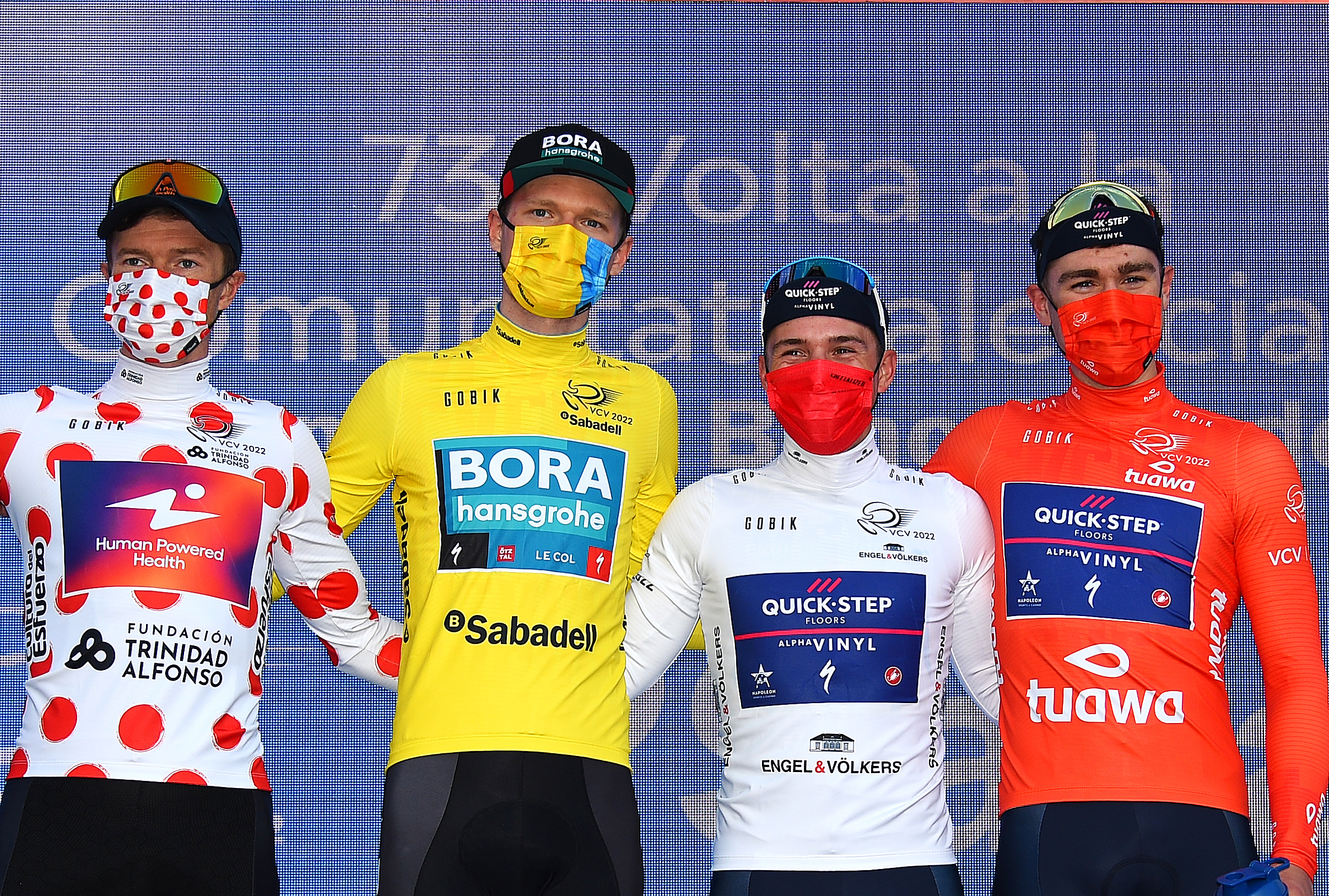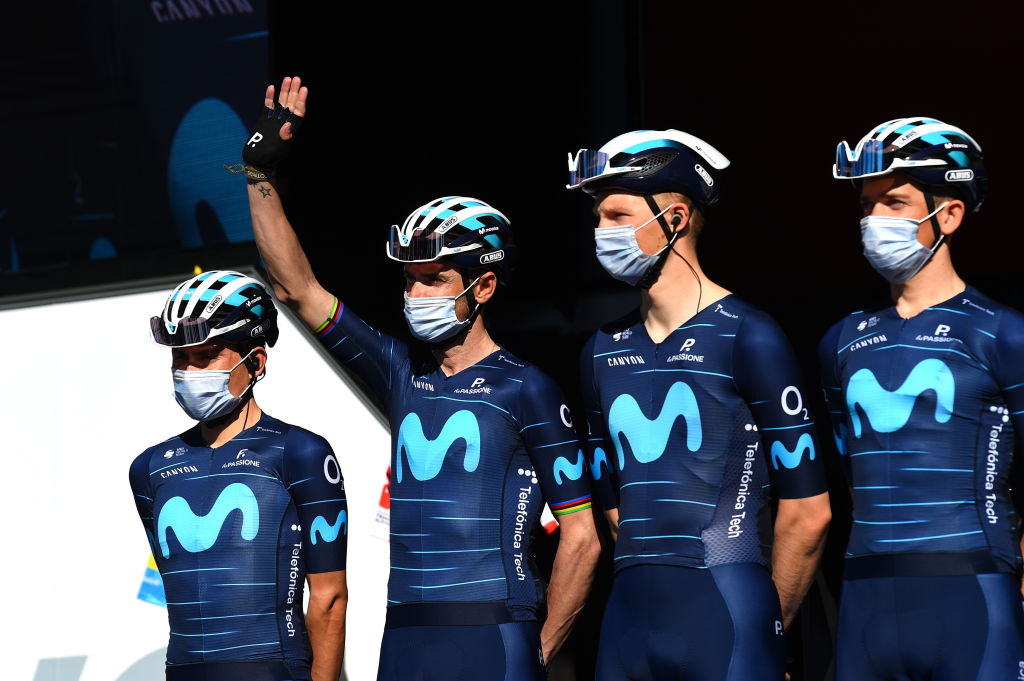Multiple COVID-19 cases spark fear in peloton before major spring races
'There are a lot of positives out there. More than anyone is saying'

As the early season races lead rapidly to major spring goals and multiple COVID-19 cases emerge in the professional peloton, riders and their teams are becoming more and more concerned about the impact the virus will have on their season.
Teams have tightened their own COVID-19 protocols time and time again but further cases are emerging daily, with both men’s and women’s races affected.
“There are a lot of positives out there! More than anyone is saying but fortunately mostly asymptomatic,” one team told Cyclingnews.
Cyclingnews has been told by another source that the spread of the highly contagious omicron COVID-19 variant in the European peloton could have been sparked by teams staying in the same hotel for the Challenge Mallorca races in late January. From there other clusters were created at the Volta a la Comunitat Valenciana and then at other subsequent races.
The switching of riders and staff for different races, who may also bring COVID-19 from home or pick it up while travelling via European airports, could also be another factor in the rising number of cases.
The peloton is not alone in feeling the increase in cases, with the spread being felt broadly across Europe. The Reuters news agency said earlier this month that the region was reporting a million cases almost every day, with about half of all new infections reported worldwide in Europe.
Teams are continuing their internal health monitoring and testing but UCI controlled pre-race negative PCR tests are only needed to take part in stage races that last seven days or longer if riders and staff have not been vaccinated. PCR testing of the peloton will only be carried out on the rest days of Grand Tours.
Get The Leadout Newsletter
The latest race content, interviews, features, reviews and expert buying guides, direct to your inbox!
New cases are emerging almost daily in the peloton across the different races.
Fernando Gaviria tested positive for a third time in two years and cannot ride the UAE Tour which starts on Sunday. His UAE Team Emirates leader Tadej Pogačar tested positive recently but has recovered and will lead the team in their home race. It remains to be seen if he can still compete for overall victory.
BikeExchange-Jayco, Jumbo-Visma and Team DSM withdrew their teams from the Volta a la Comunitat Valenciana after a number of COVID-19 cases. QuickStep-AlphaVinyl’s Davide Ballerini and Kasper Asgreen were unable to ride the Tour de la Provence, while Richard Carapaz tested positive during last week’s French race.
Alejandro Valverde and some of his Movistar teammates had to miss this week’s races Ruta del Sol as a precaution after two riders tested positive for COVID-19 at the Volta a la Comunitat Valenciana.
On Friday morning the Gazprom-Rusvelo team pulled out of the Vuelta a Andalucia Ruta Ciclista del Sol after positive COVID-19 tests amongst some of the Russian team.
The UCI recently suggested that vaccination coverage within the teams (both riders and staff) was at 97 per cent. However data from the end of 2021 indicated lower coverage, with some teams admitting they have several riders and staff who are against vaccination.
Case numbers are likely to fall in the weeks and months to come as the peak of the omicron variant passes but the current COVID-19 cases are forcing teams to shuffle rosters on a frequent basis. This is disrupting race programmes, early season form and rosters. There is a real risk that teams may have to pull out of races due to a lack of riders.
When riders test positive they have to isolate until they are negative and so are unable to ride outdoors, losing at least a week of precious training. Under UCI medical protocols riders also have to undergo strict medical check-ups on their heart and lungs before they can race again.

A long spell of out action
While some riders appear to have recovered quickly and returned rapidly to training and racing, other teams are concerned about the damage COVID-19 can create if riders suffer with serious illness and return to training too early.
One team told Cyclingnews its medical staff have advised riders against intense training until the detailed check-ups have been done. Riders can become negative within a few days but it can take up to 20 days for other riders to be negative and to complete the check-ups.
Cofidis rider Jelle Wallays tested positive when he arrived at the Volta ao Algarve and is now in isolation in a Portuguese hotel.
"I've already read some weird things about riders who have had corona and don't want to damage anything in the long term. So I'll be extra careful in the first few days," he told WielerFlits.
“I don't think I'll have recovered enough to ride the Opening Weekend in Belgium but should be okay for the rest of the spring. First I want to have my body thoroughly checked by the doctors, my health must come first."
Nobody wants to lose their team leaders and key riders on the eve of an important race like Omloop Het Nieuwsblad, the UAE Tour and especially key stage races such as Paris-Nice and Tirreno-Adriatico, while illness can wreck a riders hopes for the whole of the spring.
Peter Sagan was unable to train as planned for 17 days after he tested positive in early January and has been forced to change his racing programme and make his season debut this weekend at the Tour des Alpes Maritimes et du Var.
While most countries have eased restrictions as the latest COVID-19 numbers fall, the team are tightening their protocols to try to stop cases spreading in their ranks as the major races near.
At Jumbo-Visma, who were forced to close down their January training camp after a COVID-19 case, riders and staff are obliged to wear face masks, social distancing rules remain, riders sleep in single rooms and air purification machines are used in dining rooms and the team buses. Everyone does a rapid test every day, with riders knowing they have to quickly tell the team of any possible COVID-19 symptoms.
“The fear is there. It’ll soon be Omloop: you don't want your leader to get sick two or three days before the start," QuickStep-Alpha Vinyl team doctor Toon Cruyt, told Het Laatste Nieuws, explaining the sense of fear in teams.
“The riders know to warn us immediately if they feel anything, if their heart rate or body temperature is abnormal. We keep the riders together who have already been infected and therefore have less chance of a new infection.
Cruyt is especially concerned about infection during flights.
“You can take as many precautions as you want, it can’t be totally stopped. I think the biggest danger is in the flights. Those from Saudi Arabia and Valencia have caused a 'boom' in infections,” he suggested.
“Planes are hotbeds for COVID-19 transmission. Through the ventilation systems, the air is constantly circulating and the more you blow air, the more that it flies around.”

Stephen is one of the most experienced member of the Cyclingnews team, having reported on professional cycling since 1994. He has been Head of News at Cyclingnews since 2022, before which he held the position of European editor since 2012 and previously worked for Reuters, Shift Active Media, and CyclingWeekly, among other publications.